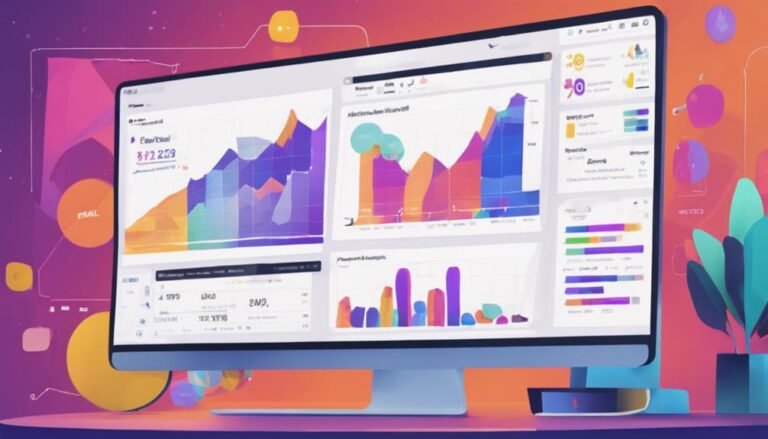Leading E-commerce Platforms for Online Stores
Did you know that by 2025, global retail e-commerce sales may top $8 billion? This growth makes picking the best e-commerce platform crucial for your online store. You might choose Shopify for its amazing AI features or Wix for its easy drag-and-drop design. Or go for WooCommerce, which is free and works with WordPress.
According to Forbes Advisor Ratings, they did a deep dive into 38 e-commerce websites. They spent over 30 hours testing them and looked at over 2,000 details to find the best.
For online stores, you can go with a cloud-based or self-hosted platform. Cloud options are great for easy setup and support. But, self-hosted platforms offer more freedom and can handle more traffic. However, they need more tech skills to manage.
The different options, like BigCommerce or Ecwid, have unique benefits. BigCommerce, for example, doesn’t charge for transactions. Ecwid won’t add extra fees on top. What you pick can really shape your online store success. The right choice can help with payments, shipping, keeping track of stock, and managing customers.
Key Takeaways
- Global retail e-commerce sales are set to exceed $8 billion by 2025.
- Forbes Advisor evaluated 38 e-commerce website builders using over 2,000 data points.
- Cloud-based platforms offer more features and support but less site control.
- Self-hosted platforms provide greater control but require more technical expertise.
- Leading platforms include Shopify, Square, Ecwid, BigCommerce, WooCommerce, and Wix.
- Pricing varies widely, with basic plans typically costing around $30 to $40 per month.
Introduction to E-commerce Platforms
E-commerce platforms are your one-stop-shop for going online. They offer everything businesses need to start, manage, and expand their stores. This includes hosting, processing payments, and designing websites. In 2020, 80% of Americans made a purchase online, showing a big chance for businesses to succeed online.
Online shopping is growing fast, so good ecommerce software is important. Companies using these platforms well often make a lot of money back. For businesses that love tech, you might like open-source platforms. They let you change things a lot. But, if you want to start quickly and grow fast, SaaS solutions might be better. They make it easy to connect with other tools and expand smoothly.
Now, there’s a new trend – headless ecommerce. These new systems separate the shopping part from the content part of the website. This makes it easier to change how your shop looks. Other new players, like Digital Experience Platforms (DXPs), are also becoming popular. They help all companies be ready for whatever customers want.
When picking an ecommerce platform, think about your budget. You’ll need to spend money on web design, app making, and keeping things secure. For a powerful and scalable online store, choose Magento eCommerce platform.
It’s also key to choose something that can grow with your business. Good customer service is a must, too. With the e-commerce market growing so fast, reaching $7.3 billion by 2025, it’s smart to find the best platform for your business now.
| Platform | Starting Cost | Main Features |
|---|---|---|
| Square Online | Free | Omnichannel Selling |
| WooCommerce | $0 for basic | Seamless WordPress Integration |
| Squarespace | $12/month | Website Design Tools |
| Shopify | $29/month | Scalability, AI-powered tools |
| BigCommerce | $29.95/month | Inventory Management, Boosting Sales |
| Kajabi | $119/month | All-in-One Platform |
It’s important for businesses to carefully consider these options when choosing a platform. Making the right decision can help them stand out in e-commerce.
Key Features of Top E-commerce Platforms
Picking the right e-commerce platform is crucial for your business. You must look closely at the key ecommerce platform features they provide.
Payment Processing
Smooth payment processing is key to happy customers. Shopify and BigCommerce are top choices because they offer various payment methods. This includes credit cards, Apple Pay, and PayPal. WooCommerce is great for those working with WordPress. It enables many payment gateway extensions for flexibility.
Shipping Integrations
A strong shipping system is vital. Shopify works with top carriers for efficient shipping on platforms like Facebook and Amazon. BigCommerce helps you sell worldwide by integrating with Google Shopping, Etsy, and more. Adobe Commerce focuses on personalized shipping with Amazon.
Inventory Management
Well-organized stock keeps things running smoothly. BigCommerce and Shopify have tools for real-time inventory tracking. Wix, when used with Ecwid, combines good design and inventory management for small shops.
Customer Management
Understanding and reaching your customers is key. BigCommerce and WooCommerce stand out here. They offer tools to track customer behavior and manage orders well. This lets businesses run effective marketing and improve customer service. Adobe Commerce is best for big companies wanting custom customer management.
Shopify: Best for AI Functionality
Shopify is a top e-commerce tool, thanks to its advanced AI features. These are great for making the customer experience better and improving how stores run. With strong AI, easy growth options, and good prices, Shopify is a hit with people wanting to start an online business.
AI-Powered Tools
AI is used well in Shopify, especially in tools like their chat assistant, Sidekick. This tool aids in quickly answering customer questions. There’s also AI for writing emails, so messages to customers feel personal. Shopify makes sure these emails reach customers at the best times.
Scalability
Shopify is known for its ability to grow with your business. As your business gets bigger, you won’t hit any walls with Shopify’s tools. They help with things like keeping track of what you’ve sold, how you get paid, and managing shipping. This lets your business grow smoothly.
Pricing
What’s great about Shopify is its pricing fits all sorts of businesses. Starting at $5 a month, it’s lower than what GoDaddy, a similar service, charges to start. Plus, Shopify Magic gives extra tools for free to all Shopify users, no matter their plan. Here’s how their plans work:
| Platform | Starting Price | Highest Price | Free Trial |
|---|---|---|---|
| Shopify | $5 | Custom Pricing | 3 Days |
| BigCommerce | $29 | $299 | 15 Days |
| Volusion | $35 | Custom Pricing | 14 Days |
| Adobe Commerce | Custom Pricing | Custom Pricing | No Free Trial |
| WooCommerce | Free | Flexible Pricing | No Free Trial |
| Squarespace | $28 | $52 | 14 Days |
| GoDaddy | $10.99 | $20.99 | 7 Days |
| Amazon | $39.99 | Custom Pricing | No Free Trial |
In the end, Shopify combines great AI tools, the ability to grow smoothly, and good prices. This makes Shopify a stand-out choice for businesses wanting to grow online.
WooCommerce: Best Free WordPress Plugin
WooCommerce is an open-source platform for eCommerce. It’s perfect for WordPress users wanting to start an online store. It seamlessly integrates with WordPress, making existing websites easily add an online store. A big community supports it, offering features for any kind of business.
Seamless WordPress Integration
Adding WooCommerce to your WordPress site is not hard. It’s great for those already using WordPress. This setup mixes eCommerce with WordPress’s great website management. You need PHP 7.4 or above, and MySQL 5.6 or greater for it to work well.
Customizability
WooCommerce stands out because you can make it your own. You can pick from many themes and add-ons in its marketplace. It supports over 140 payment options and key services like USPS for shipping. This makes things like receiving payments and sending out packages smooth.
Plugin Options
There are many plugins and themes for WooCommerce, both free and paid. They help with everything from taxes to keeping an eye on your store’s health. There’s also support for marketplaces with more than one seller and selling digital products. Created by the folks behind WordPress.com, WooCommerce has plenty of guides and plugins to help you out.
Wix: Best Drag-and-Drop Editor
Wix stands out with its easy drag-and-drop website editor. This tool makes setting up an online shop simple. Whether you’re just starting or have lots of selling experience, Wix has the right tools. These tools help you make a site that looks professional and works well, without any stress.
User-Friendly Design
Wix’s editor is known for being easy to use. It’s trusted by 250 million people around the world. No coding is needed, so you can create a beautiful website quickly.
This editor also uses AI to pick the best layout for your site. It ensures that your website is not only modern but also catches people’s eye.
Versatile Templates
When it comes to design, Wix has over 900 templates for you to choose from. No matter what your business is, you’ll find something that fits. The huge media library and the option to add 1,000 different product types make it even better.
Wix offers everything from easy-to-use online stores to services that print your designs on products. This makes Wix a great choice, no matter your business needs.
Integrated Tools
Wix also gives you tools to sell products online. Over 1 million shops use Wix’s e-commerce features. These let you create your shop, handle shipping without the hassle, and get seen more on search engines.
There are also tools for email and social media marketing, and managing a blog. These extra tools help you make more money and attract more customers to your site.
| Feature | Benefit |
|---|---|
| Drag-and-Drop Editor | No coding skills required, create sites quickly |
| Customizable Templates | Over 900 templates to choose from |
| Integrated E-commerce Tools | Marketing, SEO, dropshipping, and more |
| 24/7 Customer Support | Tutorials, help center, chat, and call scheduling |
BigCommerce: Best for Boosting Sales
BigCommerce is perfect for companies wanting to sell more online. It comes with features like customer groups and price lists. Plus, it has many marketing tools. This helps businesses grow online and internationally.
With BigCommerce, companies can easily grow their online shops. The platform lets you add new features smoothly as your business grows. It also offers affordable plans, starting at $39 a month, making it good for businesses of any size.
BigCommerce stands out for its lower Total Cost of Ownership. Companies usually earn the money back in eight months and see big returns by the third year. Add the platform’s near-perfect uptime and your online store is in good hands.
In the U.S., small businesses are very important, making up nearly all firms. Yet, some still don’t sell online. BigCommerce can help change this. It offers an easy way to customize your store, all with a single monthly fee that includes many services.
| Plan | Starting Price (Per Month) |
|---|---|
| BigCommerce Standard | $39 |
| BigCommerce Plus | $105 |
| BigCommerce Pro | $399 |
| BigCommerce Enterprise | Custom Pricing |
In the end, BigCommerce is geared towards businesses that want to sell more. Its strong features and focus on helping companies grow make it a top choice.
Choosing the Right Platform for Your Business
Choosing the right e-commerce platform is key for success. Consider your business’ needs, budget, and what features are essential. A good match leads to a strong online business.
Understanding Your Business Needs
Figuring out what your business needs online is crucial. Think about how much you’ll sell, how you want to get paid, and how items will ship. If your business relies heavily on being online, look into platforms like BigCommerce, known for their almost constant uptime. It can get your business up and running fast, typically in around 55 days, thanks to its cloud-based service.
Budget Considerations
Setting the right budget for your online store is very important. BigCommerce and Shopify may cost you $39 a month to start, while Squarespace is lower at $26 a month. WooCommerce is free to begin with, but it is more basic. You should also think about extra expenses. For example, to have everything BigCommerce offers on Shopify, you might need to spend more each year.
Choosing the right platform, like a cloud-hosted one, can actually save you money. They usually have better uptime, which means less time your store is down.
Feature Requirements
Look for features that are must-haves for your business to run smoothly online. Make sure the platform is very safe, with certificates like SSL, protection against fraud, and secure data storage. A platform with great uptime statistics, like Salesforce Commerce Cloud’s 99.99%, is a good pick for performance.
Most new online stores are choosing solutions in the cloud (SaaS). This is because they work well. Don’t forget to look for platforms supporting SEO. This helps people find your store on search engines. This way, you can get more visitors and potential customers.
Square Online: Best for Omnichannel Selling
Square Online blends physical and online sales into one. This makes it easy for small businesses to reach customers on many platforms. It’s great for entrepreneurs who want to grow their online and offline presence.
In-Person and Online Integration
Square Online links in-store and online sales seamlessly. It keeps track of what you sell in real-time, no matter where and how you’re selling. Businesses can use Square’s Point of Sale to get to know their customers better. They can create loyalty programs and offer various payment options like Apple Pay.
Ease of Use
Square Online’s friendly interface makes moving online simple. It easily brings in your product list, so you can start selling right away. You’ll also get insights into your sales and trends, helping you make smart decisions.
Affordable Pricing
Square Online stands out for its fair prices. It’s perfect for small businesses wanting to grow online. It lets you sell your products everywhere, from social media to physical stores. Plus, Square helps you manage your money well with quick access to earnings and automatic tax savings.
Ecwid: Best for No Transaction Fees
Ecwid shines in e-commerce by not charging transaction fees. This lets users keep all their profit. It’s a great choice for online stores, new or old, that want to make the most money.
Transparent Pricing
What makes Ecwid stand out is its clear pricing. With no transaction fees, businesses can enjoy all their sales money. This helps keep e-commerce costs low without any hidden costs.
Integration Features
Ecwid is great with integrations, linking with WordPress and WooCommerce easily. This means your store can be part of any website without any hard work. It also works well with social media, Amazon, and Google, making selling across many channels simple.
Setup Simplicity
Starting your store on Ecwid is easy and great for simple setups. It works well on mobiles and other screens. Plus, Ecwid helps with taxes, shipping, discounts, and ads, saving sellers a lot of time.
Ecwid doesn’t limit you to one market, either. It supports multiple currencies and tracks shipping in real time. It’s a great mix of easy use and powerful features, perfect for businesses watching their budgets.
Additional E-commerce Platforms to Consider
While Shopify, WooCommerce, and Wix are very popular, there are other additional e-commerce options worth looking at. Platforms such as Weebly, Shift4Shop, and CoreCommerce offer unique benefits. These may be better for certain types of businesses.
Weebly offers several pricing plans. These include a free option. Businesses can start with the Free plan and then upgrade to others that fit their budget. With Weebly, you get features such as pop-up notifications, SEO help, and tools to capture leads. These are useful for different types and sizes of businesses.
Shift4Shop is great for businesses on a tight budget. It’s free to start, which is perfect for startups or small companies. It also works well with various apps, making setup easy. This means businesses can start selling online with no upfront cost.
If you already have a website and want to add online selling, consider CoreCommerce. It’s known for being easy to use with many helpful tools. CoreCommerce helps businesses grow their online sales without starting over with a new website.
These additional e-commerce options add to the variety in the market. They offer features for different needs, from simple setups to new growth choices. Exploring these platforms helps businesses find the right e-commerce fit for them.
| Platform | Starting Price | Key Features |
|---|---|---|
| Weebly | Free | Pop-up notifications, advanced insights, SEO, lead capture |
| Shift4Shop | Free | Multiple integrations, seamless setup |
| CoreCommerce | Contact for pricing | Scalability, ease of integration with existing sites |
Ensuring Content Originality in Your E-commerce Store
In the competitive world of e-commerce, high-quality and original content is essential for SEO, brand credibility, and customer trust. Whether you’re creating product descriptions, blog posts, or landing pages, ensuring your content is unique can help avoid SEO penalties and build a stronger online presence.
One way to maintain content originality is by using Originality.AI—a powerful WordPress plugin designed to detect AI-generated and plagiarized content. This tool is particularly valuable for e-commerce store owners who rely on content marketing and product descriptions to attract and retain customers.
Conclusion
Success in online stores depends on picking the right e-commerce platform. Popular choices include Shopify, Wix, WooCommerce, and others. These are known for fitting different business needs. BigCommerce, for example, has helped over 55,000 stores make $4 billion. And Volusion’s $16 billion in sales prove the platform’s importance.
With global e-commerce sales reaching over $5 trillion in 2022, businesses must stay smart. They should choose platforms like Big Cartel or PinnacleCart that offer growth potential. Big Cartel serves 500,000 creative stores while PinnacleCart works with big names like HBO.
Social media and mobile are key in e-commerce’s future success. Shopify and BigCommerce are top for their features. Picking the right platform is crucial in a competitive market. It allows businesses to thrive online and reach more customers.
FAQ
What are the key features of top-rated e-commerce platforms?
Top e-commerce platforms have smooth payment processing and in-depth shipping options. They also manage inventory well and take care of customers. This blend makes online shopping easy and pleasant for all.
What makes Shopify stand out among other e-commerce platforms?
Shopify shines thanks to its smart AI tools and store optimization. It grows with your business and offers good prices. These features attract many business owners.
Why is WooCommerce considered the best free WordPress plugin for e-commerce?
WooCommerce turns WordPress sites into complete online shops easily. It offers a lot of customizations and additional plugins. This helps stores do more and look better.
How does Wix simplify the process of building an online store?
Wix has a simple drag-and-drop editor for creating e-commerce sites. It’s easy to make good-looking and functional stores with it. Wix also includes tools for marketing and tracking your store’s success.
In what ways does BigCommerce help in boosting online sales?
BigCommerce focuses on increasing sales with its special B2B features and marketing tools. It helps in expanding online and overseas. This versatility boosts sales and revenue.
What should entrepreneurs consider when choosing the right e-commerce platform?
Entrepreneurs need to think about their business’s needs and the features they require. They should also look at payment methods, shipping, and how easy it is for customers to shop online. It’s important to consider the overall cost and how well the platform will grow with the business.
How does Square Online support omnichannel retailing?
Square Online brings together both in-person and online sales. It’s easy to use, affordable, and adaptable to various sales channels. This makes it perfect for small firms wanting to sell in different ways.
What advantages does Ecwid offer to new and established sellers?
Ecwid stands out with its fair pricing that excludes extra transaction costs. It smoothly integrates with various sites and marketplaces. This simple setup helps both new and experienced sellers save money.
Are there additional e-commerce platforms worth considering?
Indeed, other platforms like CoreCommerce, Weebly, and Shift4Shop are also good choices. They each offer something special, be it simple design, unique functions, or a free model for specific business needs.
Source Links
- Best E-Commerce Platforms Of 2024
- 9 Best Ecommerce Platforms: Pros and Cons + Pricing Comparison
- The 6 best eCommerce website building platforms in 2024 | Zapier
- What is an ecommerce platform?
- E-commerce Platforms: How They Compare + How to Choose One
- E-commerce Defined: Types, History, and Examples
- 11 Best Ecommerce Platforms for Your Business in 2024 – Shopify
- How to Choose the Best Ecommerce Platform for Your Store
- Top 5 Ecommerce Platforms Used by the World’s Leading Brands – Merit Data Tech
- 10 Best AI Tools for Ecommerce Businesses (2024) – Shopify
- 11 Best Ecommerce Software for Your Business in 2024 – Shopify
- Squarespace vs Shopify: Best AI Ecommerce Builder in 2024?
- WooCommerce
- Top 10 Free WordPress Plugins for eCommerce – weDevs
- The Best Free WordPress Plugins for Building Your eCommerce Site
- Drag and Drop Website Builder: Create For Free – Wix.com
- eCommerce Website Builder: Build An eCommerce Site | Wix.com
- 10 best eCommerce platforms of 2024
- How to Choose the Best Ecommerce Platform for Startups
- Best Enterprise Ecommerce Platforms for Business Success
- The 8 Best E-commerce Platforms for Your Business — Katana
- How To Choose The Right Ecommerce Platform For Your Business | BigCommerce
- Choose the Best eCommerce Platform for Your Business
- Council Post: A Quick And Simple Guide To Choosing The Right E-Commerce Platform For Your Business
- How to Build Revenue with Omnichannel | Square
- Power your entire business | Square
- Connect & Customize Your Business | Square Commerce
- Ecwid is the Best Ecommerce Platform for Your Online Store
- Best Free Ecommerce Platforms To Start Your Online Store
- Overview of Ecwid – Most Budget-Friendly eCommerce Platforms in 2024
- 11 Best E-Commerce Platforms For Small Businesses in 2024
- 16 Best eCommerce Platforms for Creating an eCommerce Website in 2024
- 13 Top E-commerce platforms and how to choose the best one for your business
- 10 Best Hosted Ecommerce Platforms
- 5 Reasons Why eCommerce is Growing | Blend Commerce
- Ecommerce: The History and Future of Online Shopping







